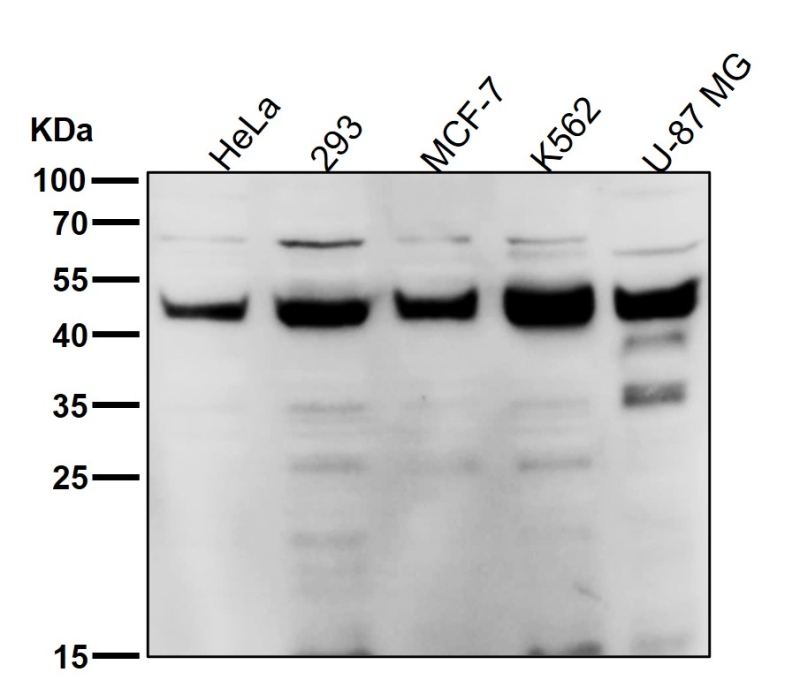
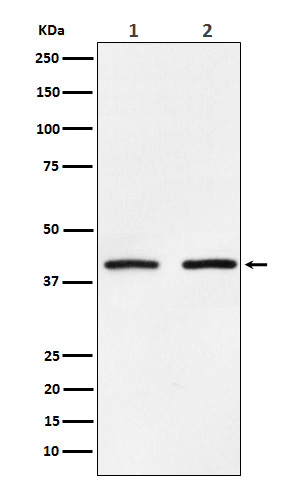
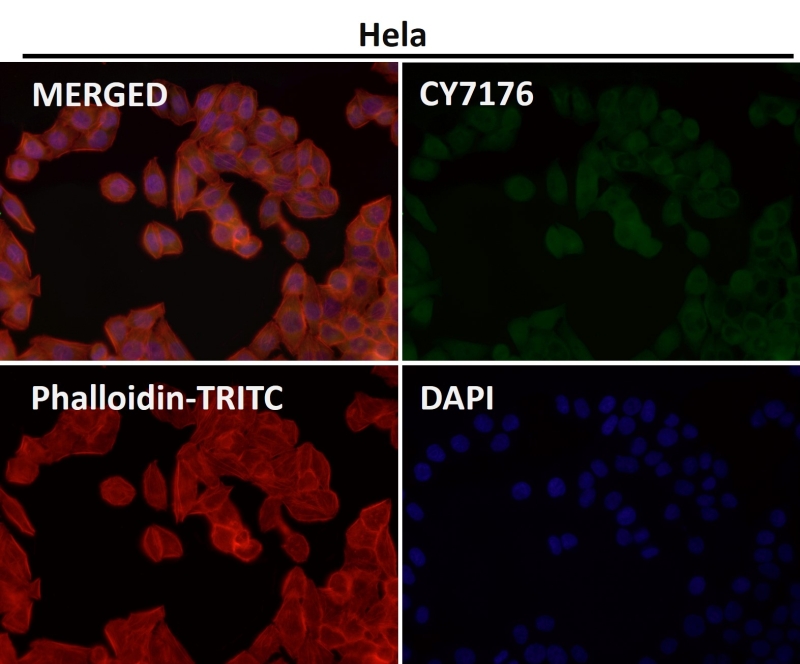
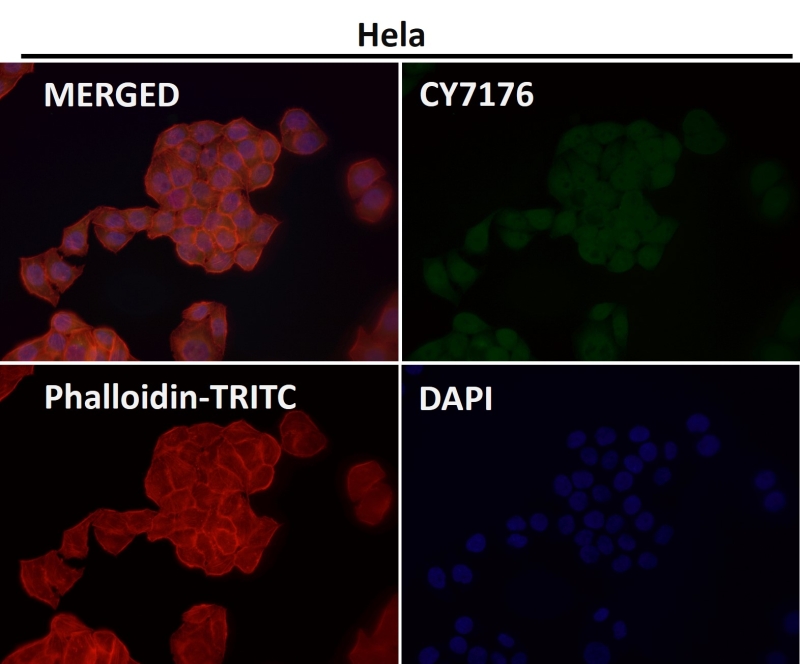
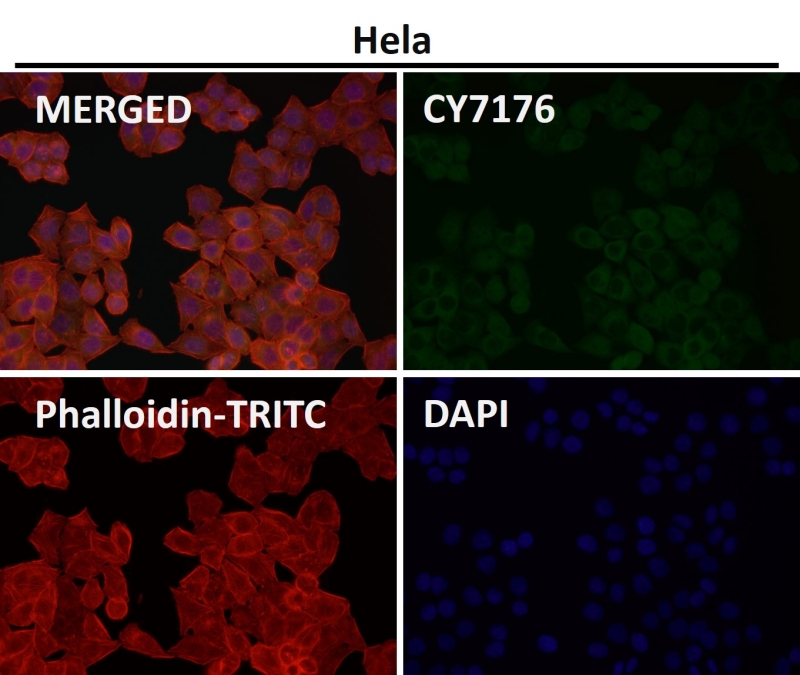
| WB | 咨询技术 | Human,Mouse,Rat |
| IF | 1/20-1/50 | Human,Mouse,Rat |
| IHC | IHC:1/100-1/200;IHF:1/50-1/200 | Human,Mouse,Rat |
| ICC | 1/50-1/200 | Human,Mouse,Rat |
| FCM | 1/20-1/100 | Human,Mouse,Rat |
| Elisa | 咨询技术 | Human,Mouse,Rat |
| Aliases | KMT3E; Smyd3; ZMYND1; ZNFN3A1;;SMYD3 |
| WB Predicted band size | Calculated MW: 49 kDa ; Observed MW: 42 kDa |
| Host/Isotype | Rabbit IgG |
| Antibody Type | Primary antibody |
| Storage | Store at 4°C short term. Aliquot and store at -20°C long term. Avoid freeze/thaw cycles. |
| Species Reactivity | Human,Mouse,Rat |
| Immunogen | A synthesized peptide derived from human SMYD3 |
| Formulation | Purified antibody in PBS with 0.05% sodium azide,0.05% BSA and 50% glycerol. |
+ +
以下是关于SMYD3抗体的3篇参考文献的简要信息:
1. **"SMYD3 encodes a histone methyltransferase involved in the proliferation of cancer cells"**
- 作者:Hamamoto, R. et al. (2004)
- 摘要:该研究首次克隆了SMYD3基因,发现其编码的组蛋白甲基转移酶在结肠癌和肝癌中过表达,并通过激活致癌基因(如Nkx2.8)促进细胞增殖。研究中使用特异性SMYD3抗体验证了其在肿瘤组织中的蛋白表达水平。
2. **"SMYD3 links lysine methylation of MAP3K2 to Ras-driven cancer"**
- 作者:Sarris, M.E. et al. (2016)
- 摘要:研究发现SMYD3通过甲基化MAP3K2增强Ras信号通路,促进胰腺癌和肺癌进展。实验中使用SMYD3抗体进行免疫沉淀和Western blot分析,揭示了其甲基化底物的分子机制。
3. **"SMYD3 promotes the epithelial-mesenchymal transition in pancreatic cancer"**
- 作者:Zhang, X. et al. (2017)
- 摘要:该研究表明SMYD3通过调控EMT相关基因(如SLUG)促进胰腺癌转移,研究利用SMYD3抗体进行免疫组化染色,证实其高表达与患者预后不良相关。
**备注**:若需更具体的抗体信息(如抗体品牌或应用场景),建议在PubMed或抗体数据库(如CiteAb)中补充检索。
SMYD3 (SET and MYND domain-containing protein 3) is a lysine methyltransferase belonging to the SMYD family, which plays a role in epigenetic regulation by modifying histones and non-histone proteins. It catalyzes the methylation of histone H3 lysine 4 (H3K4) and other substrates, influencing gene transcription, DNA repair, and cellular signaling pathways. SMYD3 is notably implicated in cancer biology, where its overexpression has been linked to tumor progression, metastasis, and poor prognosis in various cancers, including colorectal, hepatocellular, and breast cancers. Mechanistically, SMYD3 interacts with RNA polymerase II and heat shock proteins to regulate oncogenic pathways, such as RAS/ERK and Wnt/β-catenin signaling, promoting cell proliferation and survival.
SMYD3-specific antibodies are critical tools for studying its expression, localization, and function in both normal and pathological contexts. They enable detection via techniques like Western blotting, immunohistochemistry, and immunofluorescence, aiding in biomarker discovery and therapeutic targeting. Recent studies also explore SMYD3 inhibitors as potential anticancer agents, highlighting the antibody's role in validating drug efficacy. However, antibody specificity remains a consideration due to homology within the SMYD family. Research continues to clarify SMYD3's dual roles in epigenetics and cancer, emphasizing its therapeutic relevance.
×